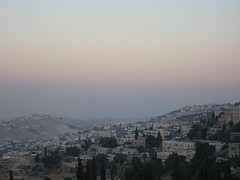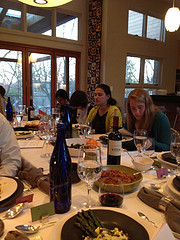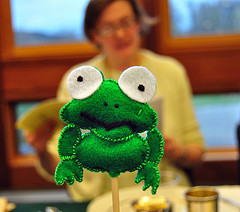Rachel Barenblat's Blog, page 225
April 23, 2012
Revisiting Tazria-Metzorah, after death and after birth
This week we're reading Tazria-Metzorah (Leviticus 12:1-15:33) -- a double Torah portion chock-full of birth, blood, tum'ah and taharah, leprosy and eruptive afflictions, nocturnal emissions, and purification rituals. This stuff is, I suspect, what makes many moderns squeamish about Leviticus. It's easier to relate to the family stories of Genesis, the stirring freedom motif of Exodus, the wilderness wanderings of Numbers and the lofty sermons of Deuteronomy...but how can these fiddly details of purification rituals no one's practiced in two thousand years really speak to us as part of our holy text?
And to be fair, some years, I've really struggled with these portions of Torah myself. Parashat Tazria begins with injunctions about how when a woman gives birth, she becomes tamei for a certain period of time. (That word is often translated as "impure;" I've written before about how and why I dislike that translation -- I think it has connotations, to the modern ear, which the original Hebrew doesn't necessarily intend.) But now that I have my own experience of giving birth to a child, I find that I can relate to these verses in a different way.
My memories of labor are distant and hazy now. (I know I'm still grateful to our doula, to the nurses, to my terrific OB, and to the anesthesiologist who administered the epidural, may there be a blessing on his house.) But I remember feeling, as Drew emerged from my body, that I was touching something deep and ineffable. It was so intense that I had to close my eyes. I remember the total astonishment of holding our son for the first time, pressed to my chest, a warm blanket fresh out of the dryer draped over both of us. Realizing that I had changed, as if by magic, into someone new.
When I read the Torah verses here about how a woman is tamei for 33 or for 66 days after birth, I think of spending my first two months of motherhood swimming against the current of postpartum depression; a different kind of tum'ah which nonetheless separated me from my community. Let me be clear -- I'm not saying that that's what the Torah verses are about, per se. And I know that every woman's experience is different. But I suspect that many women experience the first one or two months of motherhood as a different time, an overwhelming time, a time which is set apart from ordinary life.
Labor and birth were a one-time thing for me. But I am blessed now to be able to minister to people through the journey of sickness and death and burial -- and I know that every time I touch death in these ways, I come away feeling changed. Changed and charged. Electrified, almost, as though I had shed everything extraneous in myself and my life in order to go somewhere very deep. I think that deep place is the same place I touched when I closed my eyes and Drew was born. And I know that every time I go there, it takes a little while for the experience to "wear off," as it were.
When I emerge back into ordinary life, when the spiritual tingliness wears off, I'm often exhausted...but deeply grateful to have touched those depths. That's how I understand tum'ah now. Tum'ah is the stuff of blood and birth and death and ineffability. Most of us don't live our lives in constant awareness of our blood and our mortality and our deep mystical connection with something Beyond, something from which we emerge when we are born and to which we return when we are die. But birth and death, blood and semen and mysterious bodily suppurations are part of this human life. Leviticus offers us one very old framework for understanding these things and how they impact us.
As we immerse in the waters of this week's Torah portion, a question to ponder: when do you feel most connected with your body, with life and death, with God?
For those who are interested, here are the posts I've made about this parsha in previous years:
2005: Tricky Torah: taharah and tumah
2006: Meeting impurity, and being changed (originally published at Radical Torah.)
2007: Health -- and connection with God (originally published at Radical Torah.)
2008: Clean [Torah poem for Tazria] and On your house [Torah poem for Metzorah]
2009: Like God [Torah poem] -- also available in print as part of 70 faces
April 20, 2012
A birthday note for Yom Ha-Atzma'ut
Sunset over the Jerusalem hills, 2008.
Dear Israel,
There's so much I want to say to you on your 64th birthday* today.
First I want to say: it's amazing that you exist. That so many of us made our ways to your shores, battered and traumatized by the Shoah, and joined those who had been living in Mandate Palestine in building a new life, a new dream.
On this, your birthday, I celebrate your technology and innovation; your pioneering work on sustainable agriculture in deep desert; that our people's ancient language of scripture and prayer has been brought back to life as a modern spoken tongue. Nowhere else in the world does civic life move in Jewish rhythms.
It's true, there are some things I wish you were doing differently. It's frustrating that the version of Judaism which has become your state religion discriminates against other forms of Judaism. I hear things aren't necessarily so great for girls and women by you, either. I hope for better in the year to come.
I know that while you celebrate, Palestinians prepare to remember what they call the Nakba, the catastrophe: your birth. That even as you mourn 60+ years of endless fighting and terrorist attacks, they mourn displacement, the separation barrier which divides families from their orchards, settler violence, the harsh conditions in Gaza.
My Israeli friends tell me that when their grandparents fought in '48, they never imagined their grandchildren would still be fighting. I hope that in the coming year your government, and your neighbors, can make choices which lead to justice and peace. I pray for the day when you and your neighbors can celebrate side-by-side.
May the coming year bring blessings.
*On the Hebrew calendar, Yom Ha-Atzma'ut is celebrated on 5 Iyar, which begins tonight. On the secular calendar, the date of Israel's founding was May 14.
Related reading:
Yom Ha-Atzma'ut Resources from Rabbis for Human Rights. Don't miss Masekhet Ha'Atzmaut: a Talmudic-style Commentary on Israel's Declaration of Independence. Each of the eight tractates contains excerpts from Israeli founding documents, historical and contemporary commentaries related to the excerpt, and study questions.
Emily Hauser's Israel's Independence Day - same old, same old -- a powerful perspective from an Israeli-American who has chosen to live in exile.
Happy Independence Day Wishes From a Palestinian, Aziz Abu Sarah's essay, originally published in the Jerusalem Post and reprinted in +972 magazine.
Counting the Omer in the Toddler House
The year I was pregnant
I counted the weeks
until I could reveal your presence.
With each turned page
you were the size of an aspirin,
a raisin, a grape.
Your tiny heart fluttered.
You grew fingernails and kidneys.
Who could focus on the journey
through God's qualities?
I was a kaleidoscope
for splendor.
Now that you're two
I know what the kabbalists
hid in plain sight:
to God, we're all toddlers
pushing boundaries, sulking
exaggerated on the floor, then
beaming, earnest and sweet
and our Parent meets us
with lovingkindness
with boundaried strength
with perfect balance
which endures forever...
Sometimes She lays down the law
but Her arms are always open
when we run too fast in new sandals
and skin our tender knees.
I think I'm really getting into the groove of this toddler house series. This poem riffs on the practice of counting the Omer, the weeks between Pesach and Shavuot. (Here are my previous years' posts about the Omer; this year I'm posting daily Omer reflections at my congregational blog.)
In the kabbalistic understanding, each day of the 49 represents a different combination of divine qualities: chesed (lovingkindness), gevurah (boundaried strength), tiferet (harmony / balance), netzach (endurance), hod (humility / splendor), yesod (foundation), malchut (nobility / sovereignty.)
This year I can't seem to help relating to each of these divine qualities as a quality necessary in parenting. As I take note of each day, I think: how do I experience these qualities in my relationship with God? And how can I manifest them in my relationship with my son?
April 19, 2012
A poem for today
flight
on the train
you had left me
a message scrawled
across brown paper
wrapping hung like
an empty garment
bag hooked in the
baggage net
overhead it all
seemed upside down
no safety from
that direction
i could not reach
anyway
having inch by inch
shrunken into
myself pacing
the moving compartment
swaying
upside down
no safety in
any direction
— Gertrude Halstead
This is one of the poems we'll be reading tonight at my shul during our Yom HaShoah (Holocaust Memorial Day) observance. I'll be leading an evening service in which the prayers of the daily liturgy are interspersed with poems arising out of the Shoah.
Here's an interview with poet Gertrude Halstead. (Reading the interview, I just learned that apparently she is in Pittsfield, right down the road -- apparently she's now local to us.) Thank you for your poems, Gertrude. May the memory of all who endured the Shoah be a blessing.
Edited to add: here's the handout of poems we'll be using tonight, which I share in case it's helpful to any of y'all, or in case you're looking for something you can read / pray on your own today: YomHaShoahPoems [pdf]
April 17, 2012
A glimmer of hope coming out of Hebron
I want to signal-boost something I read recently which gave me hope: a post on Jewschool called The Hebron Matza Cover Initiative.
Video about the Hebron Matza Cover Initiative; if you can't see the embedded video, you can go directly to it at YouTube.
Here's a quote from the post on Jewschool:
Project Chayei Sarah is a group of rabbinical students, rabbis, Jewish educators and lay-leaders who have spent time in Hebron and are grappling with the difficult realities we encountered there...
At seder tables all over Jerusalem, friends of Project Hayei Sarah used matzah covers hand made especially for them by Women in Hebron. Purchased as an act of solidarity and of hidur mitzvah — beautification/elevation of a commandment — the matzah covers remind us of the liberation we need to continue working towards in Hebron.
“While everyone is busy debating about to boycott or not to boycott, we wanted to raise a new question: how might we, as Jews, support Palestinian economies?” relayed project coordinator Alana Alpert.
The project takes its name from the Torah portion Hayei Sarah (sometimes spelled Chayei Sarah -- transliteration is tricky stuff!), which means "The life of Sarah" -- it's the Torah portion in which Avraham purchases the cave of Machpelah in order to bury his wife there. (Here it is in English.) In that very place, the cave of Machpelah, there later came to be a house of worship, which in recent memory has been divided in two, with one end for Jews and the other for Muslims (who also venerate Ibrahim.) That place became the site of the Cave of the Patriarchs massacre in 1994.
A few summers ago when I was living in Jerusalem for the season, I took a day trip to Bethlehem and Hebron which moved me deeply. Here's a taste of the post I wrote about it at the time:
Cue the first serious cognitive dissonance of my day. Thinking of Reb Zalman davening zhikr with Sufis there in Hebron gave me such joy. Thinking of Baruch Goldstein killing people at prayer in the same room where I was reverently walking made my stomach twist with sorrow and anger. Feeling these two things at the same time -- well, facing that tension is part of why I wanted to visit the West Bank, but wow, this never gets easy, does it?
After we left the mosque, we walked down to the shopping street below. Most of the shops are boarded up, with stars of David and Jewish graffiti scrawled on the doors and lintels...
It heartens me to see my hevre (the Hebrew word means "friends," though it implies colleagues and study-partners as well; it's the root of the name "Hebron," actually) grappling with this tough stuff, and taking a simple and direct action to help create a world in which Jews can choose to beautify our festival observance while doing the good deed of directly supporting some of the Palestinian artisans whose lives are constricted by the situation in Hebron. I think we who are rabbis (or soon-to-be rabbis), Jewish educators, and lay leaders in the Jewish community have a particular obligation to educate ourselves about the Middle East and to take a leadership role in figuring out how to educate others.
I especially like the way this project spurs us to focus on real questions of how we treat one another, how our holiday celebrations can be engaged with real world realities, and how to work toward the creation of a world in which the Palestinian community and the Jewish Israeli community can live side-by-side in justice and prosperity. As Hebrew College rabbinic student Alana Alpert notes, "to boycott or not to boycott?" is a major question in the American Jewish community these days, and so often that's a conversation which generates a great deal of heat but very little light. The Chayei Sarah project is a glimmer of light.
Now I just want to know how I can buy one of those matzah covers for next year...
(Project Chayei Sarah also has a Facebook page, where they've shared several of their YouTube videos, so if that's your cuppa, feel free to follow them there.)
Ana b'Koach / Untie our Tangles (a melody for the Omer count)
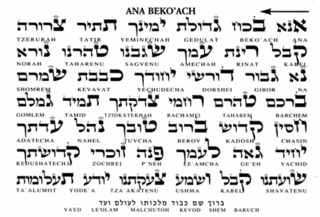
The words of "Ana B'Koach" in Hebrew and transliteration.
Back in 2010, I posted about a prayer called Ana B'Koach:
My friend Reb David Seidenberg calls Ana B'Koach one of the 'masterpieces of mystical prayer.' (Here's the NeoHasid page on Ana B'Koach, which features some explanation, some history, and the words of the prayer in Hebrew, transliteration, and English.) I first encountered this prayer when I started hanging around in Jewish Renewal circles. It's a favorite prayer in that community because of Renewal's neo-Hasidic roots.
Nowhere in the prayer do any traditional names of God appear -- but the prayer itself is considered to be one long name of God, which is why it ends with the line "baruch shem k'vod malchuto l'olam va'ed," "Blessed is God's glorious kingdom forever and ever" (or, in Reb Zalman's translation, "Through time and space, Your glory shines, Majestic One.")
In his book All Breathing Life (which I posted about a while back) Reb Zalman writes that "[This prayer] is considered by many to be a very potent passkey that takes our prayers directly to God, even when other avenues are blocked," he writes. It's also traditional, as NeoHasid notes, to sing this prayer every day after counting the Omer.
Here's Reb Zalman's translation, which can be found in All Breathing Life. It's singable to the same melody as the Hebrew. Like Reb Zalman, I like to sing it using the melody which comes from the Rhiziner Rebbe (the great-grandson of Rabbi Dov Baer, the Maggid or 'storyteller' of Mezritch).
Source of Mercy,
With loving strength
Untie our tangles.
Your chanting folk
Raise high, make pure
Accept our song.
Like Your own eye,
Lord, keep us safe
Who union seek with You!
Cleanse and bless us
Infuse us ever
With loving care.
Gracious source
Of holy power!
Do guide Your folk.
Sublime and holy One,
Do turn to us
Of holy chant.
Receive our prayer
Do hear our cry
Who secrets knows.
Through time and space
Your glory shines,
Majestic One.
(There's a more traditional translation alongside the Hebrew text at NeoHasid's Ana B'Khoach liturgy page.) You can hear Reb Zalman singing this chant to the Rizhyner's melody here at this compilation of melodies from All Breathing Life. And if you're so inclined, you can listen to me singing it, too -- I sing the first and last verses in Hebrew, and the remainder in English.
I love the idea of praying these words during the Omer journey. Spending these seven weeks contemplating God's qualities (of lovingkindness, boundaries and strength, balance, endurance, humble splendor, foundation / rootedness, and sovereignty) inevitably means also contemplating the ways in which these qualities do or don't manifest in us. It's easy to come away feeling tangled. This prayer reminds us that God can help us unsnarl our internal emotional and spiritual knots.
(This is cross-posted to the CBI From the Rabbi blog, since this melody is going to be our Song for the Month next month. To anyone who reads both blogs, apologies for the repeat!)
Poem in Spirit Voyages
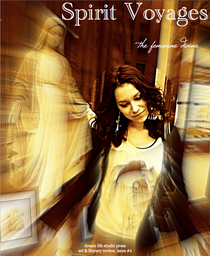 I'm delighted to be able to announce that my mother poem "Psalm for the Sixth Day (Mother Psalm 5)" appears in the April 2012 issue of Spirit Voyages, "a quarterly art and literary journal with a spiritual twist."
I'm delighted to be able to announce that my mother poem "Psalm for the Sixth Day (Mother Psalm 5)" appears in the April 2012 issue of Spirit Voyages, "a quarterly art and literary journal with a spiritual twist."
As the journal's website suggests, "Feed your spirit, spark your imagination, explore images and words that tell the story of the soul. Each issue is built organically around a theme and features work by a variety of voices working in the domain of the creative, the mystical, the empowering."
My poem appears in 2012 issue #2, which is themed around "The Feminine Divine," and you can purchase copies for a mere $8 at the magazine's website.
The journal is edited by Lori-Lynn Hurley; this issue features work by Carmen Costello, Lindsay Drya, Christine Long, Megan Monique, Shanna Sandmoen, Jackie Stewart, and Laurie Zak-Richardson -- and yours truly, of course. I don't yet know the work of any of the other contributors, so I'm psyched to read this issue.
If you're interested, please consider buying a copy! And my thanks are due to Lori-Lynn for accepting my work.
April 15, 2012
New toddler house poem
LIFE IN THE TODDLER HOUSE
It's only a zoo
when we throw a party:
two-year-olds squabbling
over the flowered magnifying glass,
seven-year-olds borrowing
every blanket in the house
for their palace under the stairs.
But even our own lone monkey
creates chaos by day's end
swinging from toy trains
to ball pit to iPad.
Once his door's pulled shut,
white noise machine engaged,
this zookeeper collapses
with glass of wine in hand.
Life was different once.
Now spontaneity means inventing
new sounds for wooden trains, not
deciding to drive north
until we find exactly the junk store
we never knew we were missing
or catching a Richard Thompson show
in a smoky bar three hours away.
But my heart grows three sizes
every morning before breakfast
when I spy my little simian
beaming through the bars
of his cage.
The newest installment in the "...toddler house" series is the first which wasn't sparked by a moment of specifically Jewish time (morning or evening prayer, Shabbat or havdalah, Pesach) but just by the big-picture experience of parenting our toddler. When I named the first toddler house poem, I was thinking of the toddler house as being a bit like the monkey house at the zoo: this is the house which is defined by its sometimes rowdy inhabitant. The zoo metaphor isn't a particularly original one, but it stuck with me, and I decided to run with it. Voila.
I'm not sure I like the line "Life was different once." (Talk about unoriginal.) But I haven't been able to come up with a succinct other way of saying it. Anyway, if you have thoughts on that line or on the rest of the poem, feel free to drop a comment.
April 11, 2012
Glimpses of Pesach 2012
One end of the table, first-night seder.
Mrs. Fausto and I were invited to celebrate the Passover seder last Friday with the family of one of our daughter Faustoette's friends. I was delighted to learn that the friend's aunt, who presided over the seder, was Reb Rachel Barenblat -- better known in the liberal religious blogosphere as The Velveteen Rabbi!
...Throughout last Friday's seder, Rachel repeatedly drew the figures and tropes of the old Exodus tale forward into the present: Who is your Pharaoh? How are you a Pharaoh to others? What chains bind you? How do you, intentionally or not, forge chains that bind others? How will you break those chains and wander toward the Promised Land in the coming year, and with whom will you make your journey? Next year in Jerusalem! -- indeed, but where is your Jerusalem, and who will be there with you?
-- Fausto's post Happy Pascha!, at The Socinian
Frog plague puppet, foreground; me, background. Photo by Len Radin.
Local Jews recounted the story of their ancestors' liberation from slavery more than 2,000 years ago and reflected on strides they have made toward their own freedom during a community Second Night Seder on Saturday.
...During the community seder, which contains 15 steps, participants were asked to share the ways they had been liberated from bondage over the past year and how they hoped to bring themselves closer to their place of freedom in the present year.
-- Meghan Foley's article Community seder retells the history of the Exodus, in The Transcript
It was lovely to celebrate the first two nights of Pesach with two such wonderful groups of people -- first my sister and her family and some of their friends, and then members of my community and my nuclear family and in-laws and a variety of community seder visitors. Moadim l'simcha to all -- wishing all of you a joyful remainder of the festival!
Robbi Nester's "Balance"
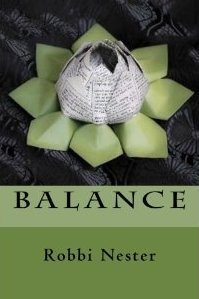 Dave Bonta at Via Negativa is reviewing a ton of poetry this month. One of the books he reviewed early in April sounded right up my alley, and I liked the excerpt he posted, so I got myself a copy. The book is Balance, by Robbi Nester. It features fifteen poems, each paired with an ink-and-brush drawing of a yoga pose. The yoga poses are part of B.K.S. Iyengar's system; the brush paintings are by Nina Canal, and they are both beautiful in themselves and useful illustrations of the poses out of which the poems arose.
Dave Bonta at Via Negativa is reviewing a ton of poetry this month. One of the books he reviewed early in April sounded right up my alley, and I liked the excerpt he posted, so I got myself a copy. The book is Balance, by Robbi Nester. It features fifteen poems, each paired with an ink-and-brush drawing of a yoga pose. The yoga poses are part of B.K.S. Iyengar's system; the brush paintings are by Nina Canal, and they are both beautiful in themselves and useful illustrations of the poses out of which the poems arose.
The poems relate to the yoga poses, or offer new interpretations of the yoga poses, or open windows into the author's life experience through the prism of the yoga poses. They manage to both be rooted in the yoga, and to transcend it.
I suspect these poems would work for readers who don't do yoga; reading them, I'm reminded of my own experiences with yoga (which are, alas, some years ago now, and I've never committed to the practice enough to call myself any kind of yogini!) but I'm also able to relate to poems which arise out of poses I never attempted or never managed. Ultimately I relate to these poems as poems about life and spiritual experience, rather than poems about anything my body can (or can't) do.
The quote on the back of the book from R. H. W. Dillard reads, "Whether one is nimble and supple enough to actually practice the fifteen yoga positions that form the subjects of the poems in Robbi Nester's Balance, one will discover that these poems do what both yoga and the best poetry have always done: take one deeply within the confines of an experience while simultaneously expanding one's awareness of the limitlessness of that very same experience." Word.
Here's one of my favorites:
Paschimottanasana
I am rowing my boat
along the quiet river.
My ribs open like a magnolia
flower, its stiff white petals
only this morning furled
in the burnished bud.
Legs strung tight as sails
I hoist myself up, out of the hip,
arranging my torso, vessel
of previous cargo, over the knees.
Currents lap at my sides
as I surge forward, pulling
the oars of my feet
till the miles fall away.
This is lovely stuff. Thanks Dave, for the rec, and thanks Robbi for the collection. (It's available on Amazon for a mere $12.)
Rachel Barenblat's Blog
- Rachel Barenblat's profile
- 6 followers


